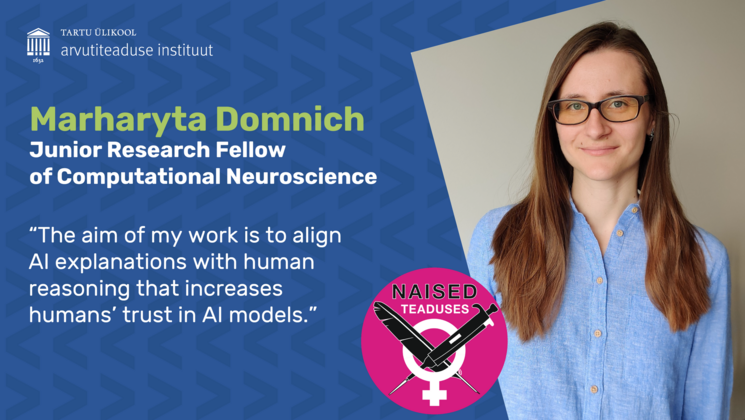-
Faculty of Arts and HumanitiesDean's Office, Faculty of Arts and HumanitiesJakobi 2 ruumid 116–121, 51005 Tartu linn, EST0Institute of History and ArchaeologyJakobi 2 51005 Tartu linn, Tartu linn, Tartumaa EST0Institute of Estonian and General LinguisticsJakobi 2, IV korrus 51005 Tartu linn, Tartu linn, Tartumaa EST0Institute of Philosophy and SemioticsJakobi 2, III korrus, ruumid 302-337 51005 Tartu linn, Tartu linn, Tartumaa EST0Institute of Cultural ResearchÜlikooli 16 51003 Tartu linn, Tartu linn, Tartumaa EST0Institute of Foreign Languages and CulturesLossi 3 51003 Tartu linn, Tartu linn, Tartumaa EST0School of Theology and Religious StudiesÜlikooli 18 50090 Tartu linn, Tartu linn, Tartumaa EST0Viljandi Culture AcademyPosti 1 71004 Viljandi linn, Viljandimaa EST0Professors emeriti, Faculty of Arts and Humanities0Associate Professors emeriti, Faculty of Arts and Humanities0Faculty of Social SciencesDean's Office, Faculty of Social SciencesLossi 36 51003 Tartu linn, Tartu linn, Tartumaa EST0Institute of EducationJakobi 5 51005 Tartu linn, Tartu linn, Tartumaa EST0Johan Skytte Institute of Political StudiesLossi 36, ruum 301 51003 Tartu linn, Tartu linn, Tartumaa EST0School of Economics and Business AdministrationNarva mnt 18 51009 Tartu linn, Tartu linn, Tartumaa EST0Institute of PsychologyNäituse 2 50409 Tartu linn, Tartu linn, Tartumaa EST0School of LawNäituse 20 - 324 50409 Tartu linn, Tartu linn, Tartumaa EST0Institute of Social StudiesLossi 36 51003 Tartu linn, Tartu linn, Tartumaa EST0Narva CollegeRaekoja plats 2 20307 Narva linn, Ida-Virumaa EST0Pärnu CollegeRingi 35 80012 Pärnu linn, Pärnu linn, Pärnumaa EST0Professors emeriti, Faculty of Social Sciences0Associate Professors emeriti, Faculty of Social Sciences0Faculty of MedicineDean's Office, Faculty of MedicineRavila 19 50411 Tartu linn, Tartu linn, Tartumaa ESTInstitute of Biomedicine and Translational MedicineBiomeedikum, Ravila 19 50411 Tartu linn, Tartu linn, Tartumaa ESTInstitute of PharmacyNooruse 1 50411 Tartu linn, Tartu linn, Tartumaa ESTInstitute of DentistryL. Puusepa 1a 50406 Tartu linn, Tartu linn, Tartumaa ESTInstitute of Clinical MedicineL. Puusepa 8 50406 Tartu linn, Tartu linn, Tartumaa ESTInstitute of Family Medicine and Public HealthRavila 19 50411 Tartu linn, Tartu linn, Tartumaa ESTInstitute of Sport Sciences and PhysiotherapyUjula 4 51008 Tartu linn, Tartu linn, Tartumaa ESTProfessors emeriti, Faculty of Medicine0Associate Professors emeriti, Faculty of Medicine0Faculty of Science and TechnologyDean's Office, Faculty of Science and TechnologyVanemuise 46 - 208 51003 Tartu linn, Tartu linn, Tartumaa ESTInstitute of Computer ScienceNarva mnt 18 51009 Tartu linn, Tartu linn, Tartumaa ESTInstitute of GenomicsRiia 23b/2 51010 Tartu linn, Tartu linn, Tartumaa ESTEstonian Marine Institute0Institute of PhysicsInstitute of ChemistryRavila 14a 50411 Tartu linn, Tartu linn, Tartumaa EST0Institute of Mathematics and StatisticsNarva mnt 18 51009 Tartu linn, Tartu linn, Tartumaa EST0Institute of Molecular and Cell BiologyRiia 23, 23b - 134 51010 Tartu linn, Tartu linn, Tartumaa ESTTartu ObservatoryObservatooriumi 1 61602 Tõravere alevik, Nõo vald, Tartumaa EST0Institute of TechnologyNooruse 1 50411 Tartu linn, Tartu linn, Tartumaa ESTInstitute of Ecology and Earth SciencesJ. Liivi tn 2 50409 Tartu linn, Tartu linn, Tartumaa ESTProfessors emeriti, Faculty of Science and Technology0Associate Professors emeriti, Faculty of Science and Technology0Institute of BioengineeringArea of Academic SecretaryHuman Resources OfficeUppsala 6, Lossi 36 51003 Tartu linn, Tartu linn, Tartumaa EST0Area of Head of FinanceFinance Office0Area of Director of AdministrationInformation Technology Office0Administrative OfficeÜlikooli 17 (III korrus) 51005 Tartu linn, Tartu linn, Tartumaa EST0Estates Office0Marketing and Communication OfficeÜlikooli 18, ruumid 102, 104, 209, 210 50090 Tartu linn, Tartu linn, Tartumaa EST0Area of Vice Rector for Academic AffairsOffice of Academic AffairsUniversity of Tartu Youth AcademyUppsala 10 51003 Tartu linn, Tartu linn, Tartumaa EST0Student Union OfficeÜlikooli 18b 51005 Tartu linn, Tartu linn, Tartumaa EST0Centre for Learning and TeachingArea of Vice Rector for ResearchUniversity of Tartu LibraryW. Struve 1 50091 Tartu linn, Tartu linn, Tartumaa EST0Grant OfficeArea of Vice Rector for DevelopmentCentre for Entrepreneurship and InnovationNarva mnt 18 51009 Tartu linn, Tartu linn, Tartumaa EST0University of Tartu Natural History Museum and Botanical GardenVanemuise 46 51003 Tartu linn, Tartu linn, Tartumaa EST0International Cooperation and Protocol Office0University of Tartu MuseumLossi 25 51003 Tartu linn, Tartu linn, Tartumaa EST0Area of RectorRector's Strategy OfficeInternal Audit Office
University of Tartu acknowledges deeds that change the world

On the eve of the anniversary of the Republic of Estonia, Rector of the University of Tartu Toomas Asser announced the deeds deserving the university’s 2021 contribution to society award, research award and language award, and the recipients of the teaching staff of the year award.
Academic Secretary of the University of Tartu Tõnis Karki said that the contribution to society award, the research award and the language award, which were given out for the first time, are important parts of the university’s new system of giving recognition. “The University of Tartu as Estonia’s national university recognises people for activities that have made a significant contribution to the development of research, society and the Estonian language. The award-winning deeds affect each and every one of us, they reach beyond Estonia and are not limited to academic circles only,” Karki explained.
The University of Tartu contribution to society award is granted for introducing the nationwide wastewater monitoring method. The method has been used since autumn 2020 for detecting the spread of the coronavirus. In the future, wastewater monitoring can be applied for various goals, for example for the detection of illegal drugs and drug residues. The award recipient is Professor Tanel Tenson and his research team including Associate Professor Veljo Kisand, Research Fellow Helen Tammert, Research Fellow Peeter Laas and Specialist Kristel Panksep.

Professor Tanel Tenson (in the middle) and his research team. Photo Andres Tennus
The University of Tartu research award is granted for developing tumour-penetrating peptides for drug delivery. This will allow to use smaller drug doses in cancer treatment in the future, significantly reducing the side effects of drugs. The recipient of the award is Professor Tambet Teesalu.

Professor Tambet Teesalu. Photo Andres Tennus
The University of Tartu language award is granted for research and development combining language and technology in the field of machine translation and neural speech synthesis. The decisive factor in choosing the language deed was that digitisation enables to ensure the development and preservation of the Estonian language. The award recipient is Professor Mark Fišel and his research team, including Head of Applied Natural Language Processing Liisa Rätsep, Junior Research Fellow Andre Tättar, Scientific Programmer Taido Purason, Scientific Programmer Maali Tars, Programmer Agnes Luhtaru, Junior Research Fellow Hele-Andra Kuulmets, Scientific Programmer Annika Laumets-Tättar and Scientific Programmer Rasmus Lellep.

Professor Mark Fišel. Photo Henry Narits
The recipients of the University of Tartu best teaching staff awards 2021 are Teacher of Norwegian Language Antonina Kostina in the Faculty of Arts and Humanities, Professor of Communication Studies Triin Vihalemm in the Faculty of Social Sciences, Professor in Dermatology and Venereology Külli Kingo in the Faculty of Medicine, and Lecturer of Botany Ene Kook in the Faculty of Science and Technology. More information on this year’s best teaching staff is available on the website of the University of Tartu.

The recipients of the University of Tartu best teaching staff awards 2021 Antonina Kostina, Triin Vihalemm, Külli Kingo and Ene Kook. Photos Andres Tennus and private collection
In the category of contribution to society, also researchers who helped to resolve the Covid-19 crisis received credit. Over two years, University of Tartu researchers have initiated more than 50 research studies, the results of which have been used by the government of Estonia for research and evidence-based crisis management. Researchers of medicine and science, as well as social sciences and humanities have made their contribution.
In the research category, the articles by Associate Professor Carlos Pérez Carmona on the research of wildlife behaviour using big data, the monograph by Professor Tõnu-Andrus Tannberg “Military history of Estonia. Selected chapters from the War of Independence to the present day”, and the conversion of Auve Tech OÜ’s autonomous vehicle to zero-emission hydrogen technology using polymer electrolyte membrane fuel cells received a special mention.
In the language category, recognition was given to the participation of the university's staff in the activities of the Estonian Language Houses set up by the Integration Foundation, the more than 20 years’ work of the pharmaceutical terminology expert committee working under the Estonian Medicines Agency, and the teaching staff of the Institute of Family Medicine and Public Health for translating the textbook "Family Medicine" and adapting it to Estonian conditions.
Read more similar news






